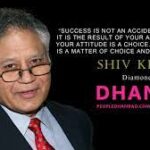A basic defect in the education system prompted educator, business consultant, and motivational speaker Shiv Khera to design a new training programme for high school and college students. According to Khera, educational institutions educate students how to earn a livelihood, but not how to live. If students are not taught essential life skills in elementary and secondary school, their skills must be “repaired” at the organisational level.
Khera believes that it takes more than credentials to be a professional, and that the current generation has never been so unprepared to confront the world. One of the reasons is that technology has made young people more familiar with machines than with humans. The second is that they have not been taught how to handle failure.
Complementing the talent, according to Khera, competence is the willingness and desire to do the task. His new training programme will educate students how to adequately apply their skills. In this interview, Khera discusses leadership styles and the necessity of soft skills for success in the modern era. Excerpts:
What changes have you observed in leadership strategies during your three decades of experience?
Corporate leadership has shifted from authoritarian to participative over the past 35 years. This has advantages and its own purpose: to build support and create synergies, thereby creating a powerful team that goes the extra mile; to make the most of collective wisdom by encouraging participation and the generation of new ideas, thereby facilitating better decision-making; and to create more leaders by empowering them. Empowerment is a result of a well-structured training programme and physical conditioning.
What should students be prepared for when they enter the workforce for the first time?
Students should have the mindset, “I will always give more than I receive,” rather than doing as little as possible to get by. Unfortunately, the new workforce has unrealistic expectations. Unaware that the real world is vastly different, they all aspire to achieve overnight success and become Executives. Organizations face the greatest difficulty in locating trustworthy and responsible individuals. Gallup’s global study reveals that 63% of individuals who report to work are disengaged, and 24% are actively disengaged. That leaves only 13% of the population employed.
What do you anticipate for the future of attitudes and leadership in the workplace?
To achieve success, businesses must invest in their employees and train them in the areas of attitude, leadership, motivation, and values.
Why is failure so significant?
It instructs us on what to do and what not to do in the future. It keeps individuals grounded and teaches us that we are all vulnerable as human beings. It promotes meekness. The importance of learning from prior errors cannot be overstated. Occasionally making an error or failing is not the end of the world. Winners learn from their errors rather than replicating them. Unfortunately, as parents and educators, we have only taught our children two words: triumph and victory. We do not instruct them on how to fail and lose. Existence does not always progress upwards. It is comparable to a rollercoaster journey. It ascends and descends. When individuals falter, they are unable to cope.
What is one noteworthy behavioural pattern that you observe in the current generation?
The current generation has changed positively in that they are in a haste. They wish to avoid wasting or losing time. They wish to reach their destination quickly. This is a positive aspect. However, in order to reach the destination swiftly, they take short routes and sacrifice their values. They frequently pursue short-term gains at the expense of long-term suffering.
Also read: Shiv Khera: A person with a positive attitude cannot be stopped
What competencies will the new leadership programme emphasise?
“Prepare Them, Don’t Repair Them” is the name of the new leadership programme we’ve designed for schools and colleges. To achieve success in life, individuals must master the following three skills: People skills; Persuasion skills; Prioritising skills.
What is the one life skill you value the most?
I would choose two: cultivating a positive attitude and upholding one’s values.




